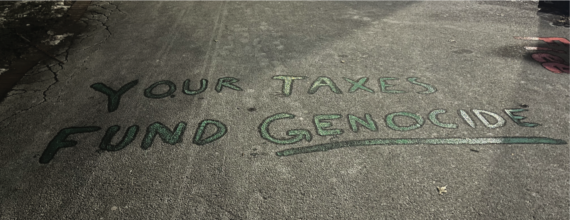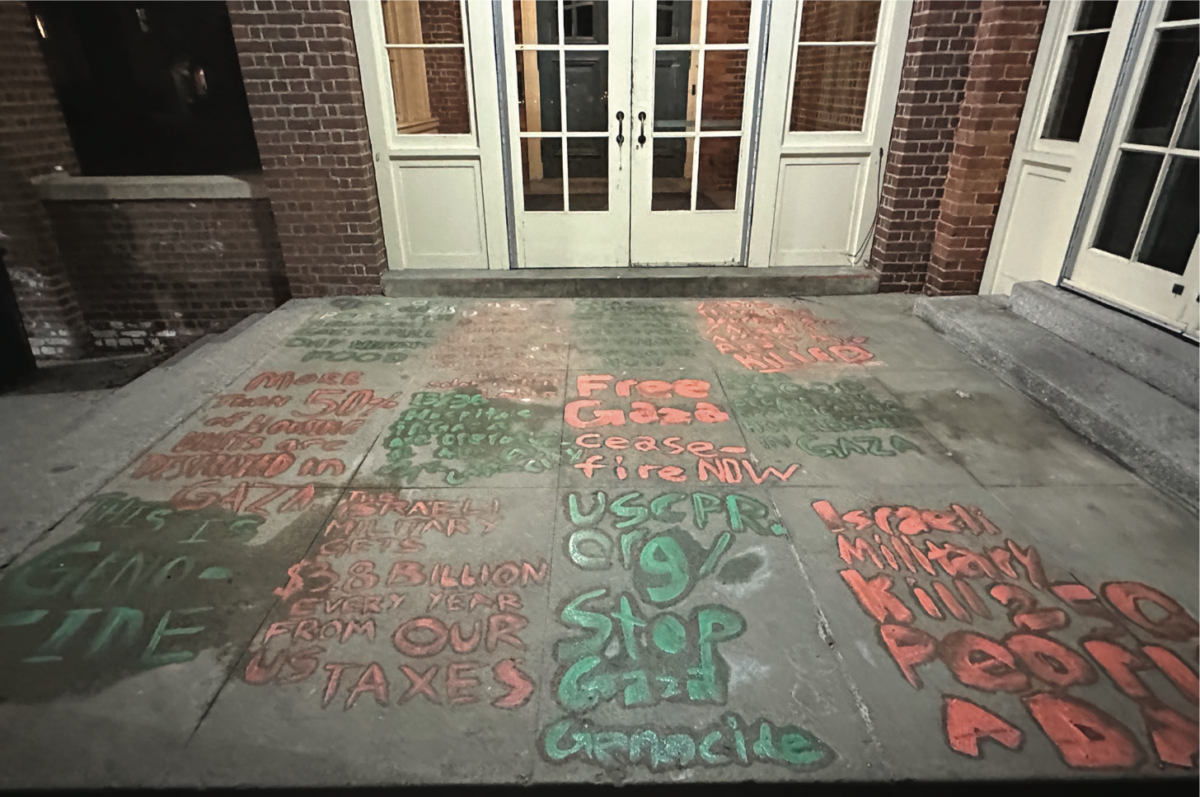Wheaton announced changes to its postering policy on Tuesday amidst a wave of controversial and politically charged posters being put up around campus.
The change in the postering policy draws attention to the question of how free expression should function on college campuses, something that universities and colleges across the country are grappling with in the wake of the October 7th Hamas attack on Israel, and the subsequent ground invasion and airstrikes on Gaza.
On Wednesday, February 15th public safety officers were seen taking down posters that called for a ceasefire in Gaza, with a QR code that directed to a page to call or email congresspeople telling them to stop sending military aid to Israel. The posters were taped to windows and doors on residential buildings and common spaces campus. When asked about the removal of the posters, head of public safety Roy Mulcahy said that public safety officers were “adhering to the policy that posters are not to be placed on glass or painted wood, as well as our free expression policy” and cited the portion of the student handbook which gives the college administration “the right in its sole discretion to remove any written materials.” Dean Parker also referenced the policy regarding postings on glass and painted surfaces in his response to The Wire and said that “campus safety officers only removed posters from non-designated areas.”
On Tuesday, Dean Parker announced to the Wheaton community that the posting policy has been revised. Wheaton students now must submit all postings and chalking to the Dean of Students Office, Residential Life, or the Student Activities, Involvement & Leadership Office (SAIL) before they are posted.
Furthermore, the website includes the update that “postings must be submitted five (5) business days in advance of the event/desired date of posting.”
On Wednesday morning, the day after the announcement, pro-Palestine messages written in chalk appeared in front of the front doorway of Emerson Dining Hall. The messages shared statistics surrounding how many Palestinians have been killed and how much military aid the United States gives to Israel. Shortly after Emerson opened, public safety officers power washed the entryway to wash away the chalk. Using security footage, the college identified the artists behind the chalking and gave them a warning for using chalk paste without prior permission.
The artists, who spoke with The Wheaton Wire on the condition of anonymity, said that “we did this in response to the humanitarian crisis that is happening in Gaza. We all care very deeply about it, and we think it deserves a lot of attention. And we worry that it isn’t getting enough.”
They also said that the postering policy was a motivator in their artwork and that the new policy “does feel like censorship in a way.”

Wheaton’s free expression policy (and free expression on campus in general) is inherently contradicting in some ways. The college states that it “is committed to the right of individuals to exercise free expression, including but not limited to political, symbolic, or artistic speech, provided only that such expression does not materially disrupt normal College activities.” But, as Dean Parker and Mr. Mulcahy stated, the college also may remove any written materials at their discretion.
The ceasefire messaging is not the only controversial messaging seen on campus. Posters on campus advertising for crisis pregnancy centers also appeared in bathrooms around campus this week. The so-called “crisis pregnancy centers” are really used to dissuade people from accessing abortions, and the state of Massachussetes warns against going to them, as they “do not provide comprehensive reproductive healthcare.”
The postering policy would allow administration to deny posters like this, which spread misinformation and could potentially cause harm to students. Similarly, if off campus people come onto campus and hang up posters with hate symbols, as happened in 2021 when posters depicting swastikas were hung up, administration would be empowered to take them down.
Many colleges have a similar policy, such as Harvard University and Northeastern University. SGA Accessibility Chair Jolie Gagnon says that the policy has positive impacts in terms of accessibility
“Requiring emails on posters is a previously established accessibility initiative that prevents situations where individuals requiring accommodations are unable to contact event organizers with their questions and concerns. Accessibility statements are supposed to be on every single flier and event post, even on social media, but usually aren’t.” Gagnon said in an email to The Wire. “Requiring contact information on posters, along with most other parts of the poster policy, were already requirements in place that just had not been enforced.”
In The Wire’s September issue, we reported that Wheaton received a yellow speech code from the Foundation for Individual Rights and Expression (FIRE) because Wheaton has “at least one ambiguous policy that too easily encourages administrative abuse and arbitrary application.” This was before the October 7th attack on Israel by Hamas, which killed 1,200 people and led to the abduction of 250, and before Israel’s subsequent siege on Gaza, which has killed 29,000 people.
While lives are lost in Gaza, American campuses are struggling with how students should discuss and demonstrate on the issue. In many cases, this has led to clashes between administration, outside groups, and students. Over in Cambridge, pro-Palestine students at Harvard University were the victims of a “doxxing truck,” which displayed the names and faces of students who signed a controversial statement which blamed Israel for the Hamas attack. It labeled the students as “Harvard’s leading anti-semites” and as a result, students’ names and information were posted on four different websites. At Columbia University in New York, pro-Palestinian student groups were suspended, due to what the school called “threatening and invasive rhetoric.”
Many schools have had demonstrations, walkouts, and protests. 30 minutes away, at Brown University, students partook in a hunger strike to pressure their university to divest from Israel.Wheaton has seen little student activism or interruption from the Israel-Hamas war. That changed last week with the ceasefire posters and the chalking, but by the afternoon, almost all of the posters were taken down and the chalk was washed away that morning.
Though it may not be the express purpose of the revised postering policy, a consequence of the change is that college administration has increased agency to take down any posters not approved by administration. It inherently discourages student discussion, activism, and organizing, which seems to be in contradiction to Wheaton’s belief that “exposure to a wide array of ideas, viewpoints, opinions, and creative expression is an integral part of participating in higher education as students prepare for life in a diverse global society.”
When asked for a comment for the article, Dean Parker provided the following:
1) Wheaton reviews institutional policies each year re. SAIL and Residential Life have always had policies and processes for student organizations to market their events as a part of event planning. The marketing policies and processes are reviewed through WheaLead Training for student organizations each semester. The enhancements of the policy were developed in review of best practices across institutions in our area.
2) Wheaton College highly values the principles of free expression and open dialogue. It is crucial to stress that this policy revision is not intended to restrict free speech but rather to improve the framework in which our community’s lively conversations and diverse perspectives flourish. It contributes to the community’s well-being and enhances the message’s effectiveness. Again, these policies were developed based on a review of best practices across institutions around postings on campus, and conversations with different constituents, including student leaders.
One aspect of power washing the chalk away which seems to trouble students and the artists the most is the swiftness with which the messages were erased, with many taking to social media to criticize Wheaton. One widely shared post read “the school takes DAYS to simple cleanup tasks but were quick to pressure wash this away,” over an image of the chalk.
This is something that one of the artists pointed out too. “Because this is a private institution, they technically have the right to reduce our free expression. It’s just insane that they would choose to do that.”
“If what we had drawn was flowers I just don’t think it would have been washed away so quickly.”
